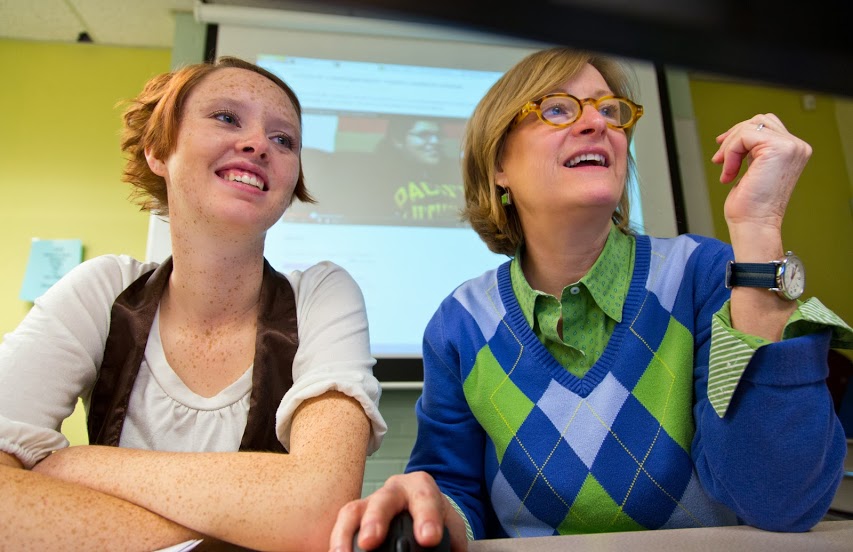Page 186 • (12,639 results in 0.041 seconds)
-
: followed by the specific title designated by the student. (1 to 4) HGST 495 : Internship in Holocaust & Genocide Studies To permit undergraduate students to relate theory and practice in a work situation. The title will be listed on the student term-based record as Intern: followed by the specific title designated by the instructor in consultation with the student. (1 to 12)
-

I feel much more confident in my application now, and I wouldn’t have been able to complete it without her honest criticism and support. About the author: Alison will graduate in spring 2014 with a double major in Communication (with an emphasis in Journalism) and German, and a minor in Music. She has been involved in student media all four years at PLU and is currently the News Editor of the student newspaper, The Mooring Mast, and the German tutor at the Academic Assistance Center. She studied
-
presentation, Pozner will show how often the television media in particular will seek out analysis from obviously partisan sources. After one of the presidential debates between Obama and Sen. John McCain, for example, one network cut to a known Republican strategist to see how he thought McCain had faired during the debate. “I’d sooner expect a building to crumble on top of me, than to hear one word of criticism on a speech from a Republican,” she laughed. She will out some code words commentators use as
-
that are entered into a search box when conducting research.Secondary sourcesSecondary sources often provide interpretation or analysis of events after they have occurred. Examples include, among others, biographies, nonfiction books, editorials, literary criticism and reviews, scholarly journals, magazines, newspapers, retweets.Tertiary sourcesA tertiary source is a collection of information which is meant to inform you with background knowledge and lead you to primary and secondary sources
-
, and critical theory. French & Francophone Studies minors will be able to: Demonstrate proficiency in French at the Intermediate-Mid proficiency level, as defined by ACTFL. Demonstrate understanding of diversity within French and Francophone cultures (in Europe, Africa, the Americas, and Asia) and of their products, practices, and perspectives. For more about the ACTFL Proficiency Guidelines: https://www.actfl.org/educator-resources/actfl-proficiency-guidelines/french
-
higher temperatures, and follows a negative linear relationship. Data will be presented on a representative cell, and the theory of the phenomenon will be presented. 3:00pm Cole Johnson – “Optical Entrapment of a Polystyrene Microsphere Using a DVD Laser” In this experiment, a DVD optical pickup drive is used to “grab” and isolate polystyrene microspheres (d ~ 10 micron) in a water solution. The consumer grade drive has been used in biomedical applications such as single cell isolation. A modified
-

(September 09, 2010) Earth Day Speaker, University of Northern Florida, The Theory of the Macaw, Jacksonville, Florida (April 25, 2010) World Conversations Keynote Presentation, Traffic in Paradise, Pacific Lutheran University (February 28, 2009) Selected Articles "Nature Is a Story That We Live: Reading and Teaching Coleridge’s “Rime of the Ancient Mariner” in the Drake Passage." ISLE ( Interdisciplinary Studies in Literature and the Environment ) December 19, 2012: "Mothers and Other Creatures
Area of Emphasis/Expertise -

Bogomil Gerganov Associate Professor of Physics he/him/his Phone: 253-535-7774 Email: beg@plu.edu Office Location: Rieke Science Center - 252 Professional Additional Titles/Roles Engineering Dual-Degree Program Director Education Ph.D., Physics, Cornell University, 2000 M.S., Cornell University, 1997 B.S., Sofia University (Sofia, Bulgaria), 1993 Areas of Emphasis or Expertise Non-Linear Cardiac Dynamics Integrable Systems Quantum Field Theory Spin-spin Interactions of Magnetic Molecules
Area of Emphasis/Expertise -
Sociology Minor20 semester hours, including: SOCI 101: Introduction to Sociology 16 semester hours of sociology. Choose from SOCI 210 (Gender and Society), 232 (Research Methods), 240 (Social Problems), 287 (ST in Sociology), 330 (Family), 332 (Race and Ethnicity), 336 (Deviance), 378 (Consumption), 387 (ST in Sociology), 391 (Sociology of Religion), 410 (Social Stratification), 494 (Gender and Violence), 495 (Internship), and 496 (Sociological Theory). STAT 233 may be included in the minor
-
through intervention or interaction (including surveys and interviews), and/or identifiable private information in a form that can be linked with that individual. designed to develop or contribute to “generalizable knowledge.” Findings disseminated with the intent to influence behavior, practice, theory, future research designs, etc. are contributing to generalizable knowledge.When in doubt, contact the HPRB (hprb@plu.edu) and we can help you figure it out.Step 2
Do you have any feedback for us? If so, feel free to use our Feedback Form.


